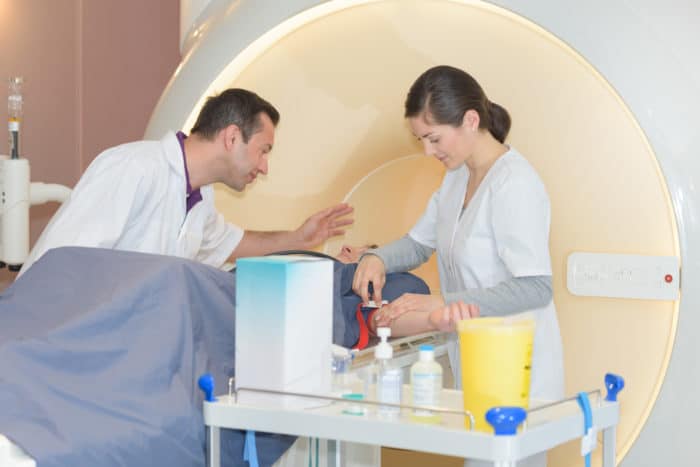Nuclear Medicine Technologist

Nuclear medicine technologists (NMTs) specialize in using radioactive materials, called radiopharmaceuticals, to create images of internal organs in a body scanner. A nuclear medicine technologist plays a vital role in the medical field for being able to study bodily functions, examine biological specimens, and diagnose or treat certain medical conditions.
In This Article
What Does a Nuclear Medicine Technologist Do?
Nuclear medicine technologists prepare and inject small doses of radioactive drugs (radiopharmaceuticals) to patients. They then use high-level imaging equipment to record images of the functioning tissues and organs made possible by the radiation given off by the pharmaceuticals. The images are then interpreted by physicians to study and diagnose infections or disorders.
A nuclear medicine technologist also gives doses of radiation to patients internal to treat medical conditions.
A nuclear medicine technologist must have a thorough knowledge of safety procedures to protect both the patient and themselves from dangerous levels of radiation exposure. After creating accurate images and keeping detailed records of the procedure, the images help physicians to diagnose medical conditions, such as cancer, disease, or tumors.
How Much Does a Nuclear Medicine Technologist Make?
According to the Bureau of Labor Statistics, the median annual salary for an NMT is $79,590 per year or about $38.27 per hour as of 2020. Those employed by colleges or universities earn significantly more than the average. Nuclear medicine technologists employed at medical diagnostic laboratories typically earn slightly less than average.
Where Do NMTs Work?
Most nuclear medicine technologists are required to wear radiation-sensitive badges at all times when on duty. They typically work a 40-hour week, which may include evening or weekend hours, and may also be required to have some on-call responsibilities.
How to Become a Nuclear Medicine Technologist
NMTs must possess at least an associate’s degree in nuclear medicine technology or a related healthcare field. However, a bachelor’s degree is preferred. Some technologists become qualified by first completing an associate’s or bachelor’s degree in nursing and then completing the one-year certificate program in nuclear medicine technology.
Nuclear medicine technology programs are offered at teaching hospitals, community colleges, and four-year colleges or universities nationwide. Training includes clinical experience under supervision, as well as coursework in human anatomy, physiology, nuclear chemistry, physics, and computer science.
Not all states require NMTs to become certified, but it is always a wise idea to expand job opportunities and marketability to employers. Nuclear medicine technology certification entails successfully completing required program courses, necessary clinical experience hours, and graduation from an accredited nuclear medicine technology program. Technologists that are interested in specializing in specific procedures, such as PETs, MRIs, or CTs, are required to have a high level of knowledge and pass the offered specialty certification examinations.
Sponsored Programs
Job Outlook
Even though Nuclear medicine technology is considered small within the healthcare industry, the employment of NMTs is predicted to grow by 19 percent between 2010 and 2020. The rate is about as fast as the average for all occupations, and it will result in an additional 4,100 new jobs throughout the decade. Career growth is expected due to the larger aging population that will require more diagnostic procedures performed by trained nuclear medicine technologists.
